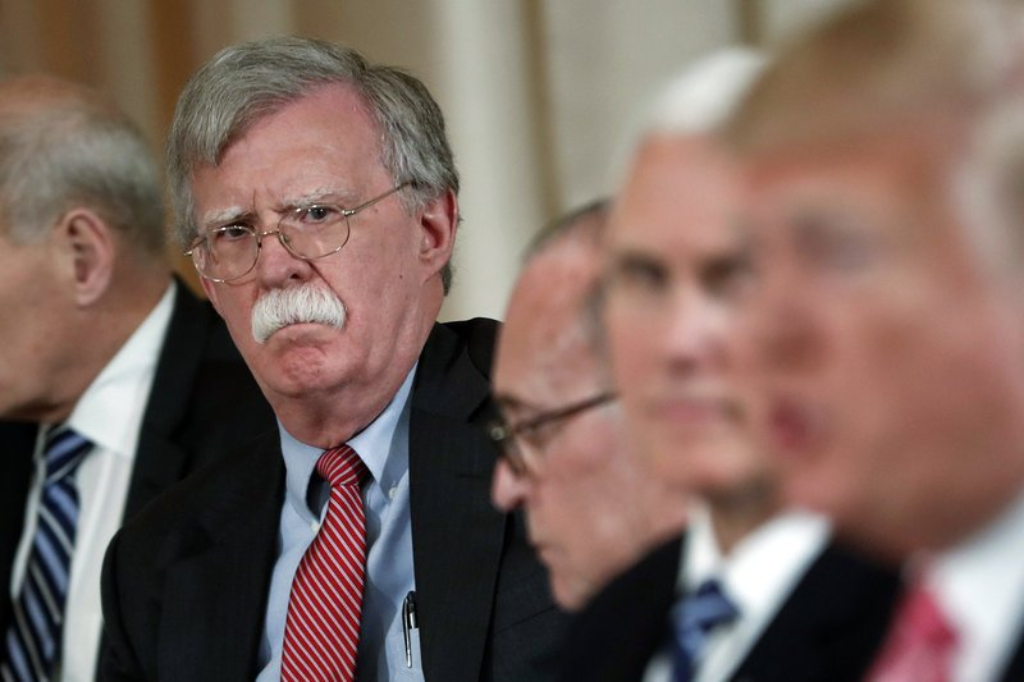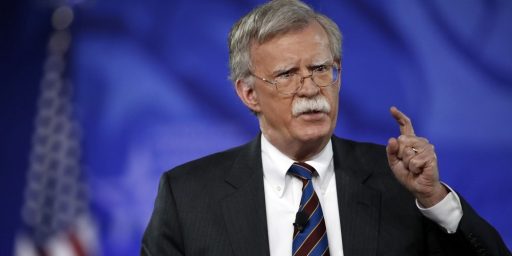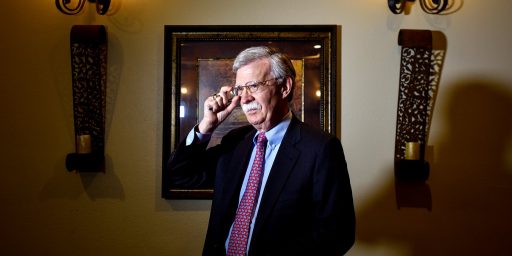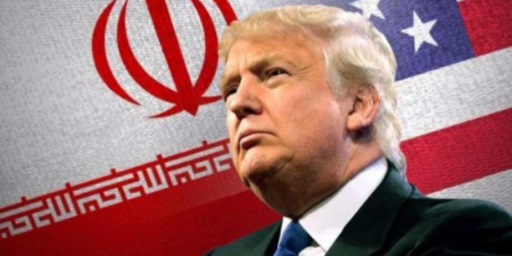Bolton Was A Bad Consigliere, But Trump Is A Bad Don
John Bolton was not a good National Security Adviser, but the real problem with Trump Administration foreign policy comes from the man at the top.

Writing in the Washington Post, Max Boot notes that while John Bolton was bad as a National Security Adviser, what follows could end up being much worse:
When Bolton’s appointment was announced in March 2018, I described him in The Post as a “wild man” with legendary “antipathy toward international treaties and organizations,” a lack of “the kind of interpersonal skills” that a national security adviser needs “to coordinate all of the defense and foreign-policy agencies,” and a worrisome predilection for preemptive wars against Iran and North Korea.
I was right to worry that the foreign policy process would become more “chaotic” under Bolton. He disdained attempts by his predecessor, H.R. McMaster, to consult with other agencies. Bolton froze other officials out of the process in the hope that he alone could shape President Trump’s decision-making. A long profile in the Atlantic noted: “If the NSC under McMaster was a consultative body, under Bolton it has become the opposite.”
How ironic, then, that Bolton — who began his tenure by excluding bureaucratic rivals — wound up being excluded himself from decision-making about Afghan peace negotiations. His skepticism of a deal was said to have “irritated” Trump. But here’s the thing: Much as I disagree with Bolton on many issues, he was right to be wary of a deal that would have led to U.S. troop withdrawal in return for empty promises of good behavior from the Taliban. Even Trump now seems to recognize that — having, at least temporarily, abandoned negotiations because the Taliban would not stop its attacks.
Bolton was also right to be skeptical about peace talks with North Korea. Unlike Trump, he never fell in love with North Korean tyrant Kim Jong Un. Bolton played an important role at the Hanoi summit in February in persuading Trump not to take a very bad deal after Kim offered to close down only one of his many nuclear facilities in exchange for a lifting of U.S. sanctions. Bolton has also been correct to note that North Korea’s short-range missile tests violated United Nations sanctions. Trump, by contrast, has recklessly given Kim permission to continue developing short-range missiles that place U.S. troops and U.S. allies in South Korea and Japan in harm’s way.
I have long been critical of the kind of interventionist foreign policy that former Ambassador Bolton has favored since his days in the Geoge W. Bush Administration and made note of my objections to his appointment when it was first made public here and here. Similarly, James Joyner noted at the time that Bolton was likely to purge the National Security Council of the remaining “sane people,” which in fact he largely did. Like Boot, I was skeptical and critical of the President’s decision to bring him on board as National Security Advisor, largely because it seemed inevitable that he would push the President toward a more confrontational policy around the world than Trump’s instincts seemed to lead him to. Indeed, it has been the President’s instincts to bring troops home from theaters since as Syria and Afghanistan that have been one of the few areas where I have actually agreed with Administration policy over the past three years.
As Boot notes, though, the President’s instinct toward a less interventionist foreign policy has also been accompanied by his instincts for the flashy show that amounts to next to nothing. This second instinct is what has brought us events such as the three summit meetings with Kim Jong Un in Singapore, Hanoi, and at the Demilitarized Zone that have amounted to absolutely nothing as well as last year’s Helsinki Summit with Vladimir Putin that was little more than an obsequious display of fealty on the part of the President that was not returned by the Russian President and not accompanied by any substantive agreements or concessions on the part of the Russian President.
To some extent, Bolton was a useful pushback against these instincts, as became clear in the role which he apparently played in persuading the President to cancel the planned meetings this week with representatives of the Taliban without getting any substantive agreement beforehand. In fact, it appears as though it was Bolton’s vocal opposition to that idea, along with his refusal to follow the lead of the Vice-President and support the President publicly on the issue that led to the final break between Bolton and Trump.
Bolton also appears to have served as something of a useful pushback against a notable outgrowth of the President’s non-interventionism, namely the extent to which he clearly disregards the value of America’s alliances, something I have made note of several times here at OTB over the past three years here, here, here, and here, This manifested itself most recently in the President’s suggestion that Russia should be readmitted to the Group of 7 even though it has done nothing to cure the reasons that it was evicted from the group five years ago. This, of course, has come at the same time that he has ingratiated himself with dictators such as Vladimir Putin, Xi Jinping, Mohammed bin Salman, and Kim Jong Un. Say what you will about Bolton, but he had a far better understanding of the value of the alliances that Trump rejects. With him gone, the President is far more likely to follow his isolationist instincts, particularly if he selects a sycophant as his new National Security Adviser.
All that being said, Bolton was of course not perfect. He was clearly trying to push the President toward more confrontational approaches toward Venezuela and Iran than Trump seems inclined toward. In that respect, it’s possible that his departure will mean a change in policy in those areas, although I really would not count on it with respect to Iran. The President had Iran in his crosshairs long before John Bolton came along, and the remaining members of his foreign policy team, including most especially Secretary of State Mike Pompeo, are as much Iran hawks as Bolton was. For that reason, I can’t say I greet Bolton’s departure as a sign that things will change in those policy areas, Instead, we’re likely to get more of the same.
In closing, Boot makes much the same argument that James Joyner does in his post this morning:
Bolton made many mistakes — just as his critics had expected — but he is not the real reason that U.S. foreign policy has been so erratic and unsuccessful over the past 17 months. If Trump wants to find the real culprit for his failed foreign policy, he should look in the mirror. Not even a president with far more acumen than Trump could possibly formulate and execute a successful foreign policy amid such incessant staff turnover — and such abrupt shifts of direction.
Trump’s foreign policy was broken long before Bolton came along, and it will continue to be broken as long as Trump is President.






I’m old enough to remember when Republicans thought Foreign Policy was important.
Bolton had certain positions and attitudes that were his public persona and signature. These were well known prior to his appointment. I don’t know of any changes in Bolton; he is what he has always been. It is Trump who is mercurial. Trump’s only fixed position, his lodestar, is that Trump is infallible.
Seeing as we are not currently engaged in hostilities with N Korea, I’d be skeptical of peace talks too.
trump has been nothing but confrontational with both since he got into office, any restraint he has shown was probably imposed by the “adults in the room” (McMaster, Mattis, Tillerson). Those guys are long gone.
Trump initially declined to hire Bolton because he didn’t like Bolton’s looks. Not from Central Casting, as Trump is wont to remark.
As if he looks presidential, with his cotton candy hair and hideous tan…